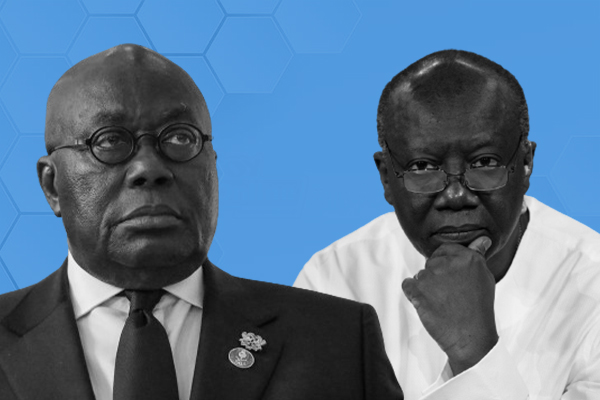In a surprising turn of events, Ghana, a country that once championed the vision of "Ghana Beyond Aid," finds itself entangled in a web of debt restructuring efforts as it seeks relief from external creditors. The West African nation, facing a significant balance of payment gap, is now in the throes of an ambitious debt restructuring programme, spurred by a $3 billion IMF bailout package.
Throughout the year 2023, Ghana's Finance Minister, Ken Ofori-Atta, found himself traversing the globe. However, this time, his journeys were not aimed at conducting Eurobond road shows but at seeking debt relief and forgiveness through negotiations for substantial debt haircuts.
According to information provided by Ghana's Finance Ministry, the country requires a staggering $2 billion annually to bridge its balance of payment gap, even after substantial support from the International Monetary Fund (IMF) and the World Bank. The debt restructuring plan aims to rework a substantial portion of Ghana's $30 billion debt, with hopes of securing approximately $20 billion through the programme.
Bilateral creditors are expected to contribute $5.4 billion to the restructuring initiative, while the remaining $14.6 billion is slated to come from commercial creditors, predominantly represented by Eurobonds. Ghana's negotiation strategy at the bilateral level involves seeking a debt moratorium and striving to secure up to a 40% haircut on the principal from commercial creditors.
The recent agreement with the Official Creditor Committee, comprised of bilateral lenders, enables Ghana to initiate a fiscal pause by suspending interest payments on bilateral loans. This development, according to the Finance Ministry, sets the stage for the IMF Executive Board's approval of the first review of the Fund-supported programme, unlocking a disbursement of $600 million. Subsequently, the World Bank is expected to consider a $300 million Development Policy Operation (DPO) financing.
Ghana's accomplishment so far lies in obtaining debt restructuring assurances, a crucial prerequisite for accessing funds from the IMF and the World Bank. The next hurdle involves engaging with various creditors, including China and members of the Paris Club, to secure memoranda of understanding determining the extent of relief. The complexity of negotiations demands careful consideration, with Ghana striving to ensure comparability of treatment among its diverse creditors.
The most significant challenge on the horizon is convincing external commercial creditors, particularly the Eurobond squad, to accept the proposed haircut on both interest and principal. These commercial creditors constitute a substantial portion of Ghana's external debt, with the Eurobond squad alone commanding 48%, and accounting for 73% of the total foreign debt marked for treatment.
But how did Ghana get to the point 'aid through debt relief'?
Following its exit from the Heavily Indebted Poor Countries (HIPC) initiative, Ghana has consistently sought external commercial loans from the Eurobond market, typically securing funds at interest rates ranging from 6% to 11%. Each fiscal year, the country requires between $1 billion to $3 billion to support its budget and address Balance of Payment (BoP) challenges.
Before the onset of the Covid-19 pandemic, the Ghanaian government had borrowed $5 billion from the Eurobond market between 2017 and 2019. Repayment was heavily reliant on revenue mobilization, a strategy that did not materialize as expected. Consequently, by the end of 2021, Ghana's debt from the International Capital Market (ICM) had escalated to $11 billion.
2017: The grace period In 2017, Ghana saw a change in leadership as President Akufo-Addo assumed office after winning the 2016 presidential elections. Under his administration, efforts were made to rejuvenate an economy heavily dependent on commodities. Shortly after his inauguration, Ken Ofori-Atta was appointed as the Finance Minister, and Dr. Ernest Addison was entrusted with leading Ghana's central bank, the Bank of Ghana.
During this period, Ghana was halfway through a $918 million International Monetary Fund (IMF) programme initiated in 2015 under the previous administration led by John Dramani Mahama. The programme aimed to reduce inflation, public debt, and the deficit while fostering economic growth. Originally set to conclude in 2017, the IMF programme provided Balance of Payment (BoP) financing support, enabling the Ghanaian government to navigate the fiscal challenges of the year without resorting to borrowing from the Eurobond market.
2018: The starting point Fuelled by positive economic forecasts and boosted credit ratings resulting from investor confidence following the successful implementation of the IMF programme, the Akufo-Addo administration made its inaugural entry into the international capital market. By the close of 2018, the government had secured $2 billion through Eurobonds, issued in both 10-year and 30-year terms at $1 billion each in May. This marked Ghana's sixth appearance in the International Capital Market since its debut in 2007.
Out of the total borrowed amount, $830.0 million was allocated to refinancing the 2022 Eurobond. Additionally, a portion of the proceeds, amounting to $750.0 million, was designated for budgetary support, while the remaining $420 million was deposited into the Sinking Fund.
2019: The triple zone In 2019, Ghana made its seventh appearance in the capital market, marking a significant milestone by successfully issuing its first triple-tranche Eurobond offering on the International Capital Market (ICM). This issuance, conducted in March 2019, raised a total of $3.0 billion through 7-year, 12-year, and 31-year Eurobonds, with amounts of $750 million, $1.25 billion, and $1.0 billion respectively. The decision to launch this triple-tranche transaction was influenced by the positive sentiments expressed by the international investor community.
During 2019, Emerging Market (EM) yields were more attractive compared to those in developed markets, providing emerging economies like Ghana with a favourable opportunity to secure more loans. Consequently, by the end of the year, Ghana's Eurobond debt had surged by more than half.
Out of the $3 billion borrowed, $283.0 million was utilized to buy back the 2023 Eurobond. Additionally, $1,872.7 million was allocated for budget support and critical infrastructure financing, while $843.9 million was earmarked for further liability management operations. The remaining $0.4 million was retained in the Eurobond account.
2020: Covid-19 and more loans Just before the onset of the COVID-19 lockdown, Ghana received strong backing from the capital market, a sentiment reinforced by Moody's, the international ratings agency, which expressed confidence in the country's economy and provided a positive outlook. In February 2020, Ghana achieved a significant milestone by becoming the first African nation to issue a 41-year bond and a second tri-tranche on the International Capital Market (ICM).
Through this endeavour, Ghana successfully raised a total of $3.0 billion by issuing 6-year, 14-year, and 40-year Eurobonds in amounts of $1.25 billion, $1.0 billion, and $750.0 million respectively. The coupon rates for these tranches were set at 6.375%, 7.875%, and 8.750% for the short-dated, medium-dated, and long-dated segments respectively. Over three years (2018-2020), Ghana accumulated a total borrowing of $8 billion from the ICM, bringing its total Eurobond issuance from 2007 to 2020 to $11.75 billion.
In the fiscal year of 2020, the $3 billion proceeds were utilized for liability management operations, refinancing energy sector debt, and meeting budgetary requirements.
2021: From trailblazer to global beggar In 2021, following the conclusion of the Covid-19 lockdown, Ghana reopened for international trade, yet faced the challenge of a substantial budget deficit. The country's financial stability relied heavily on support from the International Capital Market (ICM). In a ground-breaking move, Ghana became the first African nation to issue a zero-coupon tranche Eurobond as part of its inaugural 4-tranche Eurobond issuance, totalling a face value of $3.03 billion and generating proceeds of $2.88 billion.
This innovative transaction not only made Ghana the first sub-Saharan African Sovereign to issue a US$ bond since the pandemic began, but also expanded its market access by introducing the inventive use of a zero-coupon tranche. Out of the $2.88 billion borrowed, $125.9 million (including charges) was allocated to buy back the 2023 Eurobond through a tender offer. Additionally, $1.5 billion was used for budget support, while $1.26 billion was directed towards further liability management operations.
By the close of 2021, Ghana had accumulated a total Eurobond borrowing of $11 billion over four years: $2 billion in 2018, $3 billion in 2019, $3 billion in 2020 during the pandemic, and a final $3 billion in 2021.
In 2022, Ghana faced economic challenges as emerging markets experienced soaring coupon rates for bonds, rendering them exorbitantly expensive. The escalation of sovereign bond interest rates was exacerbated by tensions between Russia and Ukraine. Consequently, only three countries—Nigeria, South Africa, and Angola—managed to issue Eurobonds in the first half of the year.
Other nations, including Kenya and Ghana, were priced out of the international capital markets due to unsustainable interest rates. Consequently, these countries turned to IMF-supported programmes. For Ghana, the burden of debt servicing obligations, limited to interest payments only, was projected to reach approximately $5 billion at both domestic and external levels in 2023.
The burden ahead
The government of Ghana is expected to pay outstanding Eurobond loans worth at least $7.85 billion in the next 10 years, without a debt restructuring.
According to data contained in the 2021 debt report released by the Finance Ministry, nine outstanding Eurobonds maturing in the next 10 years could cost the government at least $7.85 billion, with about $3.7 billion (41.13%) of the total amount expected to be serviced in the next five years.
As Ghana prepares for potential IMF Executive Board approval, Finance Minister Ken Ofori-Atta is set to embark on diplomatic missions to China and London in the coming days. His mission: to engage with creditors in both the bilateral and commercial spheres, highlighting the critical importance of these negotiations for Ghana's economic future. Despite its earlier commitment to a vision of self-reliance, Ghana finds itself navigating the delicate path of debt restructuring, seeking to secure a sustainable economic future in the face of ongoing challenges.
About the writer:
Isaac Kofi Agyei is a Data & Research Analyst/Journalist at JoyNews based in Accra, where he covers mostly finance, economics, banking, and politics across Ghana and West Africa, from detailed analytical reports on all key issues to debt crises to IMF programmes. He also serves as the data and research correspondent for SBM Intelligence, an Africa-focused market/security leader in strategic research, providing actionable analyses of West Africa’s socio-political and economic landscape. With his solid academic background in economics and statistics and additional training from credible institutions such as the UNDP, Afrobarometr, Ghana Statistical Service, and a host of others, Isaac has honed his skills in effective data storytelling, reporting, and analysis.

Isaac Kofi Agyei
Latest Stories
-
Paris 2024: Opening ceremony showcases grandiose celebration of French culture and diversity
3 hours -
How decline of Indian vultures led to 500,000 human deaths
4 hours -
Paris 2024: Ghana rocks ‘fabulous fugu’ at olympics opening ceremony
4 hours -
Trust Hospital faces financial strain with rising debt levels – Auditor-General’s report
5 hours -
Electrochem lease: Allocate portions of land to Songor people – Resident demand
5 hours -
82 widows receive financial aid from Chayil Foundation
5 hours -
The silent struggles: Female journalists grapple with Ghana’s high cost of living
5 hours -
BoG yet to make any payment to Service Ghana Auto Group
5 hours -
‘Crushed Young’: The Multimedia Group, JL Properties surprise accident victim’s family with fully-furnished apartment
6 hours -
Asante Kotoko needs structure that would outlive any administration – Opoku Nti
6 hours -
JoyNews exposé on Customs officials demanding bribes airs on July 29
7 hours -
JoyNews Impact Maker Awardee ships first consignment of honey from Kwahu Afram Plains
8 hours -
Joint committee under fire over report on salt mining lease granted Electrochem
8 hours -
Life Lounge with Edem Knight-Tay: Don’t be beaten the third time
8 hours -
Pro-NPP group launched to help ‘Break the 8’
8 hours

